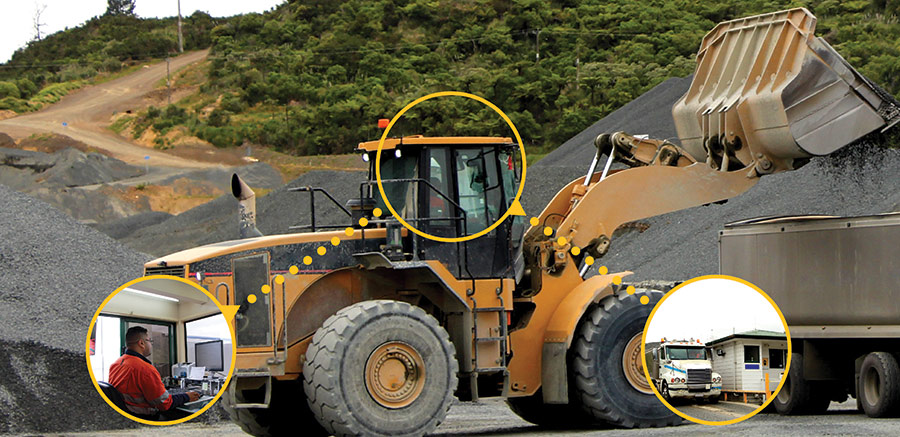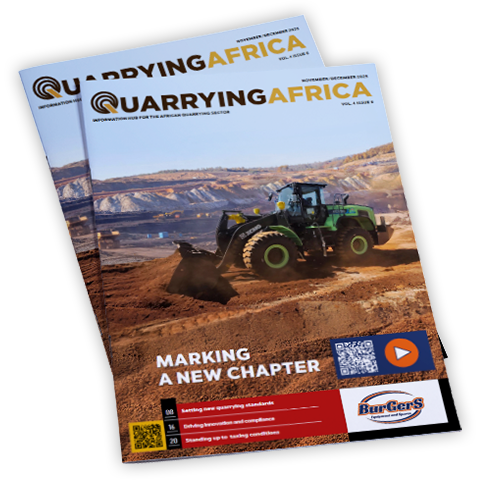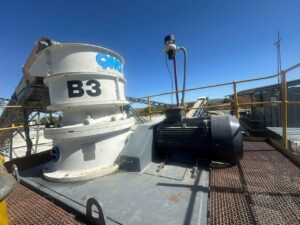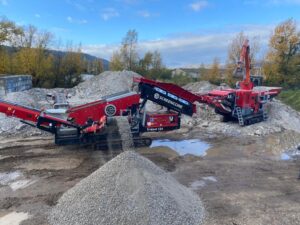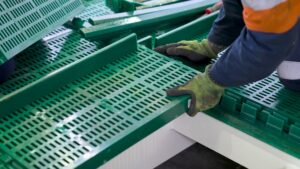Amid a growing uptake of load weighing systems in the sub-Saharan Africa market, Loadtech is debuting the Loadrite 360 payload management system to help mines and quarries get the best out of their loadout operations. Speaking to Quarrying Africa, Glen Webster, sales director of Loadtech, says the company is currently trialling the first units at one of the leading aggregates providers’ quarries.
The Loadrite 360 – a loadout automation and reporting system for quarry loadout activities – consists of a wheel loader onboard scale, an automated communications connection and a performance reporting tool. Jobs are entered in the office and selected in the loader, reducing data entry, eliminating mistakes and improving customer satisfaction.
Sören Schramm – channel development manager EMEA at Loadrite, says the technology is designed to transform the way in which quarries have always conducted their loadout processes. Traditionally, operations have relied on weighbridges alone. These are known to be prone to product errors and weight challenges.

Benefits abound
With the Loadrite 360, aggregate producers can turn their workflows around – literally. Instead of having a weighbridge at the exit, it could be moved to the entrance area, where information about the truck – including the registration, tonnage and product required – is captured and relayed to the loader. As soon as the truck drives in, the loader operator already knows the quantity and type of material to be loaded. This reduces loading-, waiting- and idle-times.
“The Loadrite 360 can holistically improve loadout operation through performance metric tracking, job data automation and real-time 360° job visibility. It connects the loader and the weighbridge so as to provide data sharing of loadout jobs, resulting in greater efficiency, improved visibility and higher product sales,” says Schramm.
The two-way automated communication shows jobs requested at the weighbridge as a job list on the scale inside the loader cab and completed loadout data is fed directly into the weighbridge ticketing system. This reduces double entry work and data entry errors for both the operator and the weighbridge attendant. Accurate on-screen job data reduces error-prone verbal communications and allows more time for loading.
The Loadrite 360 in-cab indicator clearly presents a list of loadout jobs in order of priority by truck registration. By providing simple, relevant and prioritised job data to the operators, they are empowered to complete jobs more quickly across the site with no loss in loading accuracy. The list of loadout jobs also provides richer loadout job queue data and thus reduces verbal communication errors and truck waiting time.
The system uses shared visibility of payload data, job data automation and performance metric tracking to highlight opportunities for improvement. The performance reports track loader metrics including tons per hour (tph) across multiple or individual loaders, actual time spent on truck loading activities and loader operator efficiency which highlights staff training needs.
With the InsightHQ reporting option, managers can monitor site production and performance anywhere, at any time, on any mobile device or web browser. InsightHQ also allows centralisation of data from excavator and belt scales.
“Although the Loadrite 360 is primarily a tool to improve the accuracy and speed of loadout operations, it can also reveal hidden improvement opportunities,” says Schramm. “The system enables users to drill into production data to see individual trucks, loaders or even bucket-by-bucket data and identify opportunities to improve.”
“With the Loadrite 360, quarry operators can reduce fuel and maintenance costs by avoiding unnecessary idling of loaders and trucks in loadout. It also provides quarries with increased truck visibility to ensure that trucks are loaded to capacity in the shortest time possible,” adds Webster.

Increased uptake
Schramm tells us that, in recent years he has observed increased uptake of load weighing systems in Africa, as local mines and quarries began to see the value of digital systems. Loadtech’s growth in the past two to three years, he says, is a clear indication that the market is maturing.
“Loadtech has been a Loadrite dealer for the past 24 years, and today the company is one of our most trusted and experienced dealers in the world. In the past few years, they have done very well for us. We believe it is largely to do with the maturity of the local market, which is now ready for digitalisation of processes. Some, however, still operate in the ‘stone age,’ but the majority of customers now understand what they have to do to survive in such a cut-throat business environment,” explains Schramm.
Loadtech has recorded a substantial 15% business growth in the past three years, confirms Webster. “Covid-19 has taken some of the competitors out of business and this has contributed to about 5% of our growth in the past two years. The remaining 10% is purely new business driven by the increased uptake of these solutions in the local market,” he says.

The sound support structures have also been key to Loadtech’s success. For example, the company has a dedicated data specialist who works closely with customers to help them interpret and make sense of the data generated by the Loadrite systems. This, says Schramm, makes a significant difference in customer operations.
“Data is one thing and making sense of it is quite another. Having a dedicated data specialist is therefore a big benefit for customers who need to translate data into workable solutions for their businesses,” says Schramm.
“We have also grown our technical team, which is key to our support capabilities, by almost 100% in the past two years. Consequently, we can now guarantee our customers a 24-48-hour turnaround for any technical issues. We also offer continuous operator training and stay connected with all our customers,” concludes Webster.
